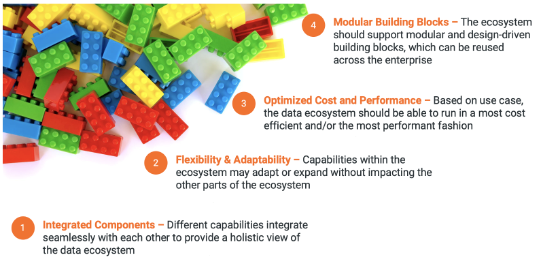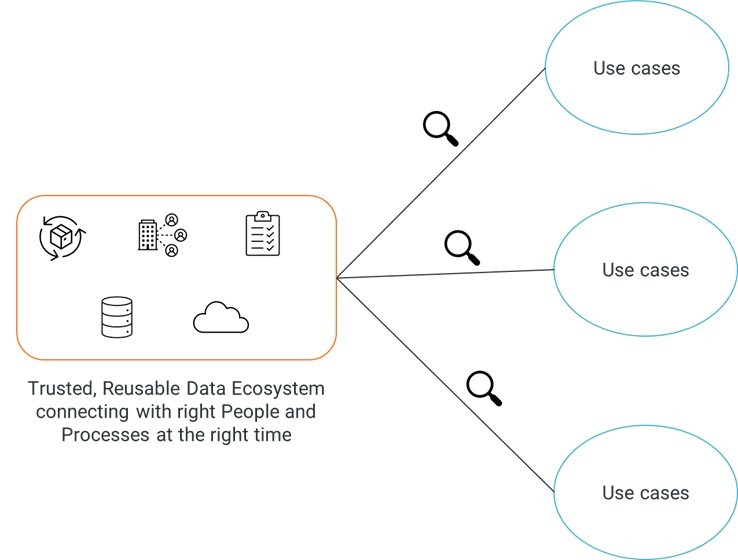The Power of AI: Building a Robust Data Ecosystem for Enterprise Success

The article emphasizes the importance of building a comprehensive data ecosystem for enterprises, covering key principles, critical components, and value drivers for success.
As enterprises strive to produce results rapidly in a dependable and sustainable manner, the significance of the underlying data becomes paramount. A major challenge in managing this data is the diverse set of capabilities required within a data architecture. It's important to consider not only the time needed to integrate various data integration and management capabilities for a seamless experience but also how these processes vary across different segments of the organization.
Moreover, with the emergence of new innovations and advancements in technology, these capabilities must be continuously updated and refactored. Against this backdrop, it becomes critical to construct a data platform — or more aptly, a data ecosystem — that can be utilized enterprise-wide, offering complementary, flexible, and scalable capabilities.
The benefits of a data ecosystem are manifold, offering increased agility and trust while minimizing risk. Moreover, the significance of a data ecosystem extends to data literacy and the development of data skills—it represents a synergistic network of people, processes and technologies dedicated to the collection, storage, sharing and utilization of data. It is imperative for enterprises to encourage their teams to learn about, comprehend and embrace the data ecosystem.

Figure 1. The key principles of a data ecosystem
Why Does Artificial Intelligence Require a Robust Data Ecosystem?
As organizations innovate with Artificial Intelligence (AI), it’s essential to ensure a strong data foundation that enables trust, scalability and collaboration. As shown in Figure 1, a data ecosystem ensures that communities innovating with AI (traditional and/or generative) can leverage the key components of a robust data ecosystem in a future-proof manner. The ecosystem provides all the components required to scale AI-related use cases with data products providing a vehicle to procure and consume data in a reliable and observable manner.
This includes:
- Data infrastructure
- Compute and performance
- Data management for insights about data and its quality
- Data Governance
- Security and related master and metadata
What Are the Critical Components in a Data Ecosystem?
Data Infrastructure
The data infrastructure serves as the foundational pillar on which all other capabilities are built, whether singularly or in multiples. Enterprises are increasingly adopting a hybrid approach, integrating on-premises systems with various cloud services to fulfill distinct functions. Concurrently, it's crucial to address key elements such as security and policy management within this infrastructure, particularly to accommodate regulated industries and comply with data residency requirements and regulations like GDPR and CCPA. Additionally, the ability to efficiently scale applications — by facilitating their onboarding and expansion within this data infrastructure — is equally essential.
Data Storage and Compute
Today, relying solely on a single data lake or data warehouse is no longer sufficient as data infrastructures continue to develop. Various storage and compute resources must be employed based on specific needs such as the use case, speed of data and the analytical patterns applied. Meanwhile, universal frameworks and formats like Apache Iceberg and Delta are emerging to standardize storage solutions, alongside the increasing use of common compression formats such as Parquet and Avro. These need to be compatible across hybrid data infrastructures so that when enterprises transition to a different cloud provider, the shift in data storage and computation can occur without significant effort.
Holistic Data Management
A holistic yet flexible data management ecosystem should be able to operate across a hybrid multi-cloud infrastructure, harnessing the capabilities of various data storage and compute resources, regardless of the applications or clouds in use. The data management console ought to be designed for centralized control while allowing decentralized execution throughout the hybrid multi-cloud infrastructure. For instance, if an enterprise uses Snowflake for storage and compute, data management functions such as data quality should be translated into Snowflake-native procedures. Similarly, if an enterprise opts for Databricks, it should adapt its processes to leverage Databricks' native Spark capabilities, allowing them to function efficiently within the data ecosystem.
Data Governance and Data Products
It’s important to empower
the enterprise where the data management components can be supported with a
strong data governance layer and a data products-based data sharing layer. This
approach requires the support of a strong metadata foundation to link the
business and enterprise concepts with the complexity of the underlying
technology. It empowers the non-technical data users to work with the data. They
can do so without fully understanding the details of the underlying storage,
compute and infrastructure ecosystem.
Scaling data governance capabilities require a strong layer of
automation that incorporates collaboration and recommendations. This ensures
your data ecosystem is used correctly and allows manual tasks to be automated. In
essence, the data governance and data products layer must be tightly integrated
with the rest of the data management layer.
Analytics and Operational Processes
This layer is designed to support analytics and operational processes, encompassing AI and machine learning, self-service reporting, and applications related to operations. It is crucial that data management and data governance capabilities collaborate to provide trusted data products for both analytics and operational systems. Analytics leverage this refined intelligence to interact with the underlying data storage, compute resources, and data infrastructure layers to access the most relevant datasets.
Value Drivers for the Enterprise
Compounded Value
If the data ecosystem is well-designed and constructed, it will already hold substantial value as new use cases arise. This value manifests in the ability to identify existing data products efficiently, connect with the appropriate data managers, establish trust in the data, and effortlessly prepare and combine the data to meet the specific requirements of each use case.

To further elucidate the value, a well-designed data ecosystem enables the following:
Reduced Risk and Increased Accountability
The data ecosystem can provide a set of integrated services and capabilities, which ensures easy transparency, connecting different aspects of the enterprise together. Focusing on collaboration enables business units to contribute as they see the extracted value for their business unit and the enterprise as a whole.
Increased Agility
The whole framework of the data ecosystem is based on modularity and reuse. This enables the enterprise to identify, leverage and automate providing increased agility. For example, automating data classifications to connect different classified elements to metadata and data storage entities and attributes enables easier/consolidated data quality and protection.
Reduced Cost and Gained Value
Costs can be reduced in several ways, first by consolidating technology capabilities and reducing point solutions, the cost to integrate across solutions and the cost to manage and maintain all the solutions and skills. The second step would be to leverage smart capabilities such as FinOps where, for instance, the data management layer can — based on workloads — run on the most cost-efficient data storage and compute option based on use cases.
Summary
A data ecosystem provides considerable value and adaptability for enterprises and leaders with a forward-looking, AI-driven strategy. Such an ecosystem must be dynamic, adapting continuously as new business requirements and technological advances emerge. It is crucial for teams to grasp the entire data ecosystem, rather than applying a single capability to every use case. Achieving the full spectrum of benefits also typically necessitates a cultural shift in enterprise workflows. This transformation enables data office teams to effectively manage, maintain, scale and quantify the data ecosystem's value throughout the organization.
We Provide consulting, implementation, and management services on DevOps, DevSecOps, DataOps, Cloud, Automated Ops, Microservices, Infrastructure, and Security
Services offered by us: https://www.zippyops.com/services
Our Products: https://www.zippyops.com/products
Our Solutions: https://www.zippyops.com/solutions
For Demo, videos check out YouTube Playlist: https://www.youtube.com/watch?v=4FYvPooN_Tg&list=PLCJ3JpanNyCfXlHahZhYgJH9-rV6ouPro
If this seems interesting, please email us at [email protected] for a call.
Recent Comments
No comments
Leave a Comment
We will be happy to hear what you think about this post